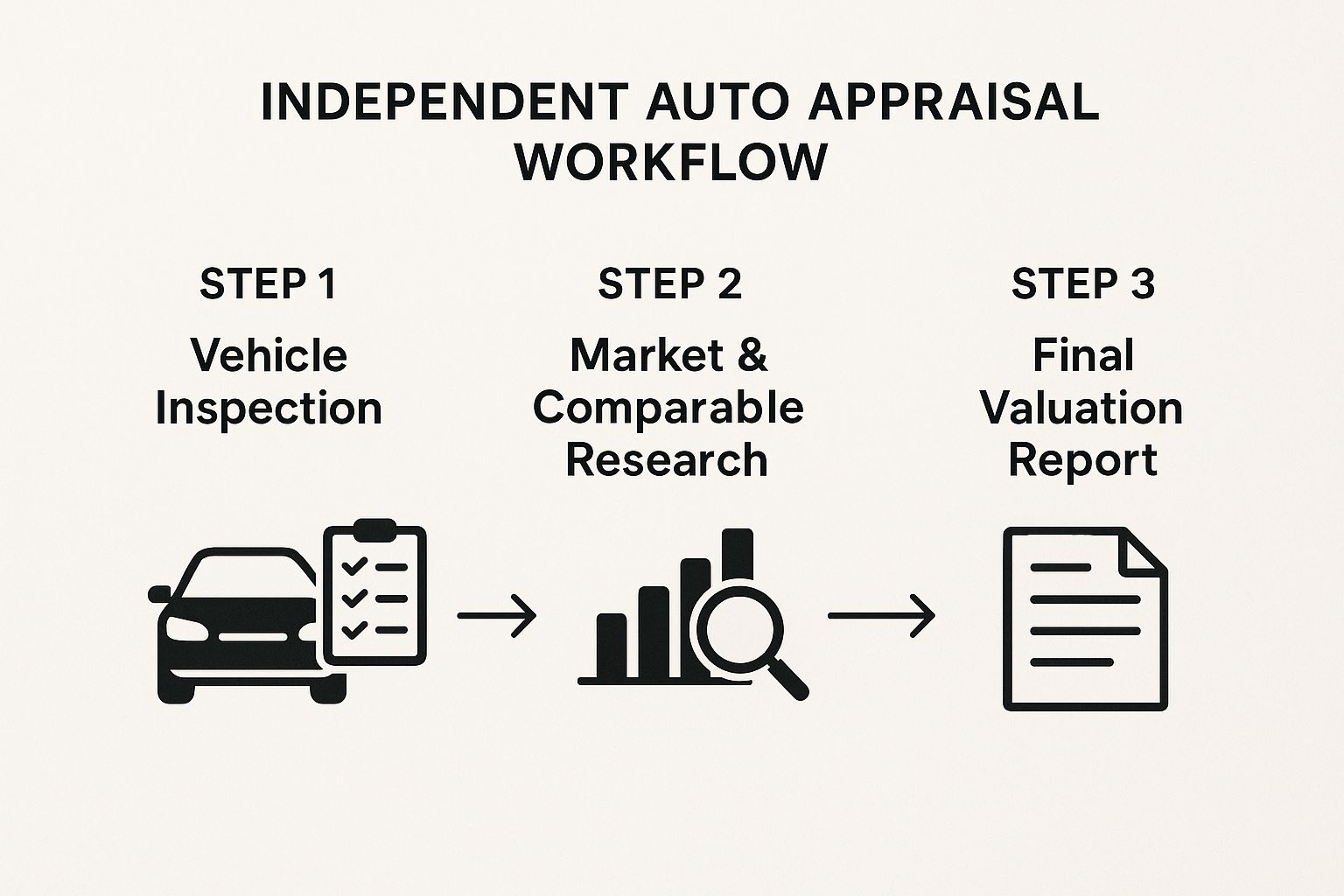When an insurance company's settlement offer feels insultingly low, an independent auto appraiser becomes your most powerful advocate. They provide an unbiased, third-party valuation of your vehicle's true worth, giving you the leverage needed to secure fair compensation after an accident. This is especially critical in total loss or diminished value claims.
Why You Need an Independent Appraiser

After a collision, the insurance carrier’s goal is simple: close your claim for the lowest amount possible. Their appraiser works for them, not you. The valuation they give you is often spit out by software that pulls from auction data or wholesale figures—not the real-world retail market where you'd actually have to buy a replacement car. That’s a huge conflict of interest.
An independent appraiser, on the other hand, works exclusively for you. Their only job is to determine your vehicle's true Actual Cash Value (ACV) based on its pre-accident condition, mileage, options, and what similar cars are actually selling for in your local area. This impartial assessment is your key to challenging a lowball offer.
Insurance Appraiser vs. Independent Appraiser
It's easy to get confused about who's who. Here’s a quick breakdown to highlight the fundamental differences between the appraiser your insurance company uses and the one you hire yourself.
| Factor | Insurance Company Appraiser | Independent Appraiser |
|---|---|---|
| Who They Work For | The insurance company | You, the vehicle owner |
| Primary Motivation | Minimize the payout for the insurer | Determine the vehicle's true market value |
| Valuation Source | Often uses wholesale or auction data | Focuses on local retail market prices |
| Outcome Goal | A settlement favorable to the insurer | A fair settlement for you |
As you can see, their loyalties and objectives are completely different. This distinction is precisely why having your own expert is so crucial.
A Real-World Scenario
Let's say your well-maintained 2021 SUV is declared a total loss. The insurer offers you $24,000, but you quickly find that comparable models on local dealership lots are all listed for around $29,000. That $5,000 gap is a serious problem.
By hiring an independent appraiser, you get a detailed, professional report that justifies the higher market value. It will include comparable vehicle listings and a point-by-point analysis of your car's condition and features. This report becomes your primary negotiation tool. Many policies have a specific provision for this situation, and you can learn how to invoke the appraisal clause in your auto insurance to formally present your independent valuation.
An independent appraisal isn't just a second opinion; it's documented, evidence-based proof of your vehicle's value. It transforms the negotiation from your word against theirs into a fact-based discussion, often resulting in a settlement thousands of dollars higher than the initial offer.
Ultimately, finding an independent auto appraiser near you is about ensuring you aren't forced to accept an unfair settlement. It's a small investment to get the full amount you are rightfully owed, allowing you to replace your vehicle without paying out of pocket for the insurer's low valuation.
Where to Find a Reputable Independent Auto Appraiser Near You
So, you need an independent appraiser. Typing "independent auto appraiser near me" into a search bar is a start, but it's often not the best one. You’ll get a flood of results, but how do you know who’s truly qualified versus who just has a good website? Let's talk about where the pros look.
Your first stop should be the professional organizations that govern the industry. These groups aren't just clubs; they enforce strict ethical codes and require members to pass rigorous certification exams.
A great example is the American Society of Appraisers (ASA). Their website has a "Find an Appraiser" tool that lets you filter by location and, more importantly, by specialty. This is how you find someone who truly understands the nuances of, say, classic Porsches or late-model diminished value claims, not just a generalist.
The appraisal process is meticulous, involving much more than a quick glance at your car. A true professional conducts a detailed investigation, blending a hands-on vehicle inspection with in-depth market research to arrive at an accurate, defensible value.

As you can see, it's a comprehensive workflow. This is why vetting your appraiser is so important—you're paying for their expertise and their process, which leads to a report that holds up under scrutiny.
Tap Into Your Local Car Community
Sometimes the best leads come from good old-fashioned networking. Think about the people in your area who live and breathe cars.
Your trusted local auto body shop is an absolute goldmine. They're on the front lines, dealing with insurance companies and appraisers every single day. They know who writes solid, detailed reports that get results and who, frankly, doesn't. A quick conversation with the shop manager can give you a top-tier recommendation.
Don’t overlook local car clubs either. If you have a classic, a custom build, or a specialty vehicle, the members of these groups are your people. They are obsessive about their cars' value and can almost certainly point you to an appraiser they've personally used and trust.
A personal referral from a trusted source in the local auto scene is often worth more than a dozen online reviews. These folks have real-world experience and can guide you to an appraiser with a solid reputation right in your own community.
Making Your Online Search Smarter
When you do use a search engine, you have to be specific to cut through the noise. Broad searches give you broad, often unhelpful, results. Get granular with your search terms based on what you actually need.
Instead of a generic query, try these:
- "Certified diminished value appraiser in [Your City]" – This is key if your car was repaired after an accident and you're fighting for the lost resale value.
- "Total loss vehicle appraiser near me" – Use this when an insurance company has declared your car a total loss and you suspect their offer is too low.
- "Classic car appraisal services [Your State]" – Absolutely essential for vintage, exotic, or highly modified vehicles that require a specialist's eye.
Using these more precise phrases helps you sidestep the generalists and find an independent auto appraiser who has the exact expertise your case requires. It’s a simple shift that makes a massive difference in finding the right professional from the get-go.
How to Vet an Appraiser's Credentials

Alright, you’ve got a shortlist of potential appraisers. Now comes the crucial part: digging in to see who really knows their stuff. This is where you separate the true professionals from the rest, because you need an expert whose report will hold up under the insurance company’s microscope.
Start by looking at their credentials. While the auto appraisal world doesn't have one single, mandatory license, certain certifications are a strong sign of expertise. Affiliations with professional organizations or specialized training from respected industry bodies like I-CAR are great indicators. For a broader overview, it can be helpful in understanding automotive certifications in general.
This background check gives you a solid foundation for what to look for.
Asking the Right Questions
Credentials on paper are one thing, but real-world experience is what truly counts. You need to ask direct, specific questions to gauge if they've handled situations just like yours. Don't be hesitant—a true pro will be happy to demonstrate their expertise.
Before you even pick up the phone, have a few questions ready.
- "About how many total loss or diminished value claims have you handled in the last year?"
- "What valuation databases do you use? Are you subscribed to NADA, CCC, or others?"
- "Could you send over a sample report? Of course, with any personal client info removed."
Their answers are incredibly telling. You'll quickly get a feel for their experience level and the professional tools they rely on. A detailed, well-organized sample report is a fantastic sign of quality.
A great appraiser does more than just look up values; they build a case. Their report should tell a story, justifying the vehicle's worth with hard data and clear evidence from your local market.
Finally, do a quick search for online reviews and testimonials. Read what past clients have said, looking for consistent comments about their professionalism, communication, and—most importantly—the results they achieved. Taking these steps ensures the appraiser you choose is the strongest possible advocate for your claim.
Understanding Appraisal Costs and Value
When you start searching for an independent auto appraiser near me, one of the first things on your mind is probably the cost. It’s natural to wonder about the fee, but I always advise clients to think of it as an investment in getting a fair insurance settlement, not just another bill to pay.
So, what should you expect to pay? Most experienced appraisers work on a flat-fee basis for a standard total loss or diminished value report. You'll typically see prices ranging from $300 to $750. The exact amount really depends on your location and the specifics of your vehicle. A heavily modified truck or a rare classic car, for instance, requires a lot more detailed research than a common sedan, so the fee will reflect that extra work.
What Am I Paying For?
Simply put, you're paying for an expert's time, knowledge, and a meticulously crafted report. A professional appraiser doesn't just glance at your car; they spend hours on a thorough physical inspection, digging into your local market for truly comparable sales, and building a document that can hold its own against an insurance company's arguments.
The fee is a direct reflection of their specialized training and years of experience in the field. To put it in perspective, the average salary for an independent auto damage appraiser hovers around $67,979 annually, with top professionals earning over $86,000. You're hiring a skilled professional, not just someone filling out a form.
A $500 appraisal fee might feel like a lot upfront. But when it helps you secure a settlement that's thousands higher than the insurance company's initial offer, the return on that investment becomes crystal clear.
If your vehicle was declared a total loss, a solid appraisal is the most powerful tool you have. For a more detailed look at this process, our guide on how much your totaled car is worth is a great resource. In the end, a quality appraisal more than pays for itself by ensuring you don't leave thousands of your own dollars behind.
Navigating the Total Loss Appraisal Process

When your insurance company declares your car a "total loss," it can feel like the final word. But it's not. In reality, that declaration is usually just the opening move in a negotiation. Knowing why this is happening more often these days is the first step toward getting the fair settlement you deserve.
The market itself is a huge reason more cars are getting totaled out. Inflation and persistent supply chain problems have sent the price of new and used cars soaring. This means even a car with what looks like fixable damage can be declared a total loss. Why? Because the high cost of parts and labor can quickly push the repair bill past the insurer's limit, which is typically 70-80% of the car’s pre-accident value.
On top of that, modern cars are packed with technology. Features like Advanced Driver Assistance Systems (ADAS) rely on expensive sensors, cameras, and computers embedded throughout the vehicle. Repairing these systems requires specialized equipment and training, driving repair estimates even higher. An independent appraiser is your best ally in this situation.
Challenging the Insurer's Valuation
The first offer you get from the insurance company for your car's Actual Cash Value (ACV) is exactly that—an offer. It's based on valuation software they choose, which often doesn't capture the true market conditions in your specific area. You absolutely do not have to accept it.
This is where hiring your own independent appraiser changes the game. They don't work for the insurance company; they work for you. Their job is to build an unbiased, evidence-backed report that shows what your vehicle was really worth right before the accident.
A professional appraiser's report is built on solid evidence, including:
- Your vehicle’s specific condition, mileage, and unique options.
- Recent sales data for truly comparable vehicles in your local market.
- The real-world cost to replace your car, not just low-end auction prices.
This detailed report becomes the foundation of your negotiation. For a closer look at what goes into this process, our guide on the essentials of a total loss appraisal breaks it down even further.
An independent appraisal completely shifts the power dynamic. It forces the insurance company to justify their number against a professional, data-driven valuation instead of just expecting you to take a lowball offer.
Ultimately, this process gives you the confidence and the proof you need to challenge an unfair settlement. When you search for an "independent auto appraiser near me," you aren't just getting a second opinion—you're getting an expert advocate who will fight to get you the full value you're owed.
Answering Your Top Questions About Auto Appraisals
Even after you've decided to get a second opinion, a few questions always seem to pop up. Getting these sorted out will help you feel much more confident as you search for an independent auto appraiser near me.
First off, everyone wants to know how long this whole thing takes. The hands-on vehicle inspection is surprisingly fast, usually wrapping up in 30 to 60 minutes. The real work, however, happens back at the appraiser's desk. They need to dig into market data and write up their findings, which means you can expect the final, comprehensive report in about two to five business days.
What Does a Great Appraisal Report Actually Look Like?
I can't stress this enough: not all appraisal reports are created equal. A flimsy, bare-bones report won't do you any good. A professional, detailed document, on the other hand, is your single best tool for negotiation.
Here’s what you should demand in a quality report:
- Detailed Vehicle Data: This means the VIN, exact mileage, a full list of all options (both factory and aftermarket), and a clear description of the car's condition right before the accident.
- High-Quality Photos: Good pictures are non-negotiable. They need to show the vehicle's overall condition, its unique features, and any normal wear and tear that existed pre-accident.
- Local Market Comparables: This is key. The report must include actual examples of similar vehicles that have recently sold or are for sale in your local area. This is what establishes a true, local market value.
- Certified Valuation: It has to end with a firm number—the appraiser’s official conclusion on the vehicle's Actual Cash Value (ACV), backed by their signature and credentials.
This level of detail is exactly why an independent appraisal is so effective. You aren’t just arguing; you're presenting a fact-based counteroffer to the insurance company's initial low valuation.
The whole point of an independent appraisal is to give you irrefutable, evidence-based proof of what your vehicle was really worth. It shifts the conversation from your word against theirs to a negotiation based on solid data.
Another question I get all the time is about diminished value. This concept is pretty simple: it's the drop in your car's resale value after it's been in an accident, even with flawless repairs. A car with an accident history is just worth less to the next buyer. To successfully claim that loss, you almost always need an independent appraiser who specializes in calculating and documenting the exact amount of diminished value.
For more general info and answers to common questions on a range of car-related topics, the Cars4Go automotive blog can be a pretty useful resource.
When you're staring down a lowball insurance offer, you don't have to take it. The expert team at Total Loss Northwest specializes in total loss and diminished value appraisals, giving you the hard evidence you need to fight for a fair settlement. Visit us at https://totallossnw.com to get the powerful advocacy you deserve.





